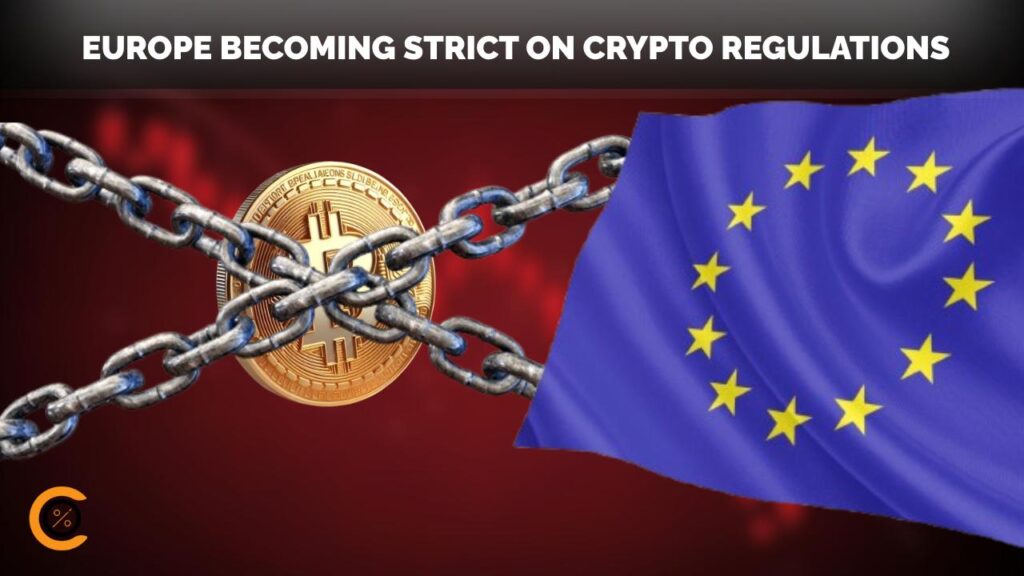- •The MiCA framework is under pressure as EU states apply rules unevenly, raising fears of regulatory gaps.
- •The EU is expanding sanctions to directly block Russian crypto transactions and related platforms.
- •Finance ministers agreed on a framework to limit digital euro holdings, moving the project closer to launch.
The world is witnessing EU’s move on making stricter rules on crypto as Europe tightens grip on crypto as the bloc navigates growing regulatory, political, and financial pressures. These stricter rules and policies on the EU’s crypto landscape shows the EU’s landmark Markets in Crypto-Assets (MiCA) framework implementation challenges, expansion of sanctions by directly targeting Russian crypto transactions and EU’s push towards launching its own central bank digital currencies.
These events show signs that the EU on crypto is determined to hold stricter control on the ever-evolving crypto landscape while balancing innovation, security, and sovereignty.
MiCA Framework Under Strain
The EU’s MiCA framework was rolled out with the aim of simplifying crypto business operations by offering one license valid across all 27 member states, a process known as “passporting.” However, since the framework’s main goal was to keep the market unified, it is already starting to face pressure, with national regulators in countries like France, Italy, and Austria raising concerns that companies might exploit the system by registering in jurisdictions with more lenient rules.
Experts fear that without consistent application of MiCA, the goal of a unified single market could collapse, much like what happened in the past with Cyprus and Malta under MiFID (Markets in Financial Instruments Directive), where finance firms clustered in less strict jurisdictions.
Larger crypto firms may benefit from easier access to the EU, but smaller firms face the heavy burden of compliance, which could ultimately push them out of the market. The bigger challenge lies in ensuring that all 27 national regulators, with varying levels of scope and experience, apply the MiCA framework evenly. If implemented properly, Europe could create a safe and attractive environment for global crypto activity.
Related read: France May Block Crypto Companies Licensed in Other EU Countries
EU Seeks to Block Russian Crypto Transactions Platforms
With its strict policies continuing, the EU is preparing its 19th sanctions package and for the first time, it directly targets Russia’s cryptocurrency platforms. This latest measure will prohibit all crypto transactions by Russian residents and include restrictions on foreign banks tied to Russia’s alternative payment systems, according to European Commission President Ursula von der Leyen. She added that the move reflects growing efforts to counter Russia’s use of digital assets to bypass sanctions, especially after a recent large-scale missile attack on Ukraine.
Reuters reported in March that Russian oil companies have already been using Bitcoin and Tether to conduct tens of millions of dollars in monthly transactions despite existing restrictions. Furthermore, the US Department of Justice charged Iurii Gugnin, a Russian citizen residing in New York, with laundering hundreds of millions of dollars through crypto services linked to sanctioned Russian entities.
The EU’s plan to sanction Russian crypto platforms aims to prevent Russia from conducting illegitimate activities worldwide and to support global peace and security.
EU Finance Ministers Planning Framework On Limiting Digital Euro Holding
EU finance ministers have agreed on a framework to impose limits on how much of the upcoming digital euro individuals will be allowed to hold.
This marks a significant step toward launching the bloc’s central bank digital currency. The agreement primarily focuses on the procedures for setting caps rather than deciding the exact limits. The move responds to ongoing debates within the EU and globally about the role of central bank digital currencies (CBDCs) versus stablecoins. While the European Central Bank (ECB) continues to push for a digital euro, some EU member states have expressed concerns about privacy risks and potential negative impacts on commercial banks. To ease these concerns, the ECB emphasized that the digital euro will preserve user privacy, function offline like cash, and ensure citizens always have access to a universal, secure form of payment.
The ECB’s plan ensures that limiting individual digital euro holdings will not negatively affect consumers’ access, while also protecting monetary sovereignty and reducing reliance on foreign-issued digital assets.
Looking Ahead
Europe’s recent policy plans related to digital assets and crypto have been cautious yet decisive, indicating that continuous regulation is needed to protect consumers, companies, and financial stability from exploitation, challenges, and international threats. The EU has consistently shown support for crypto while maintaining a readiness to regulate policies whenever global developments require action, ensuring both innovation and security for its markets and citizens.







